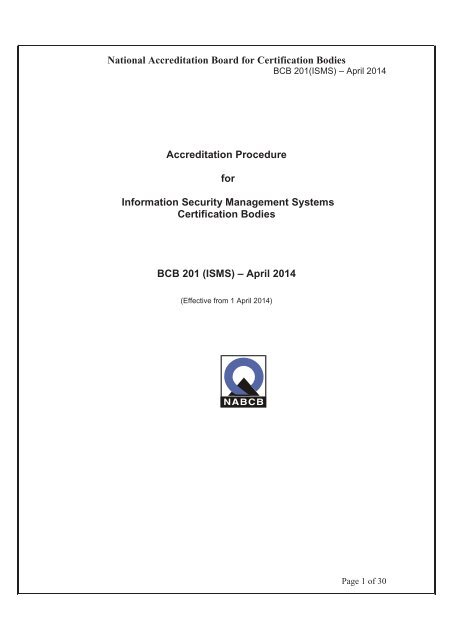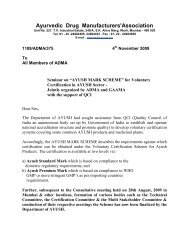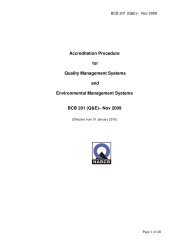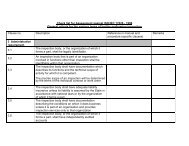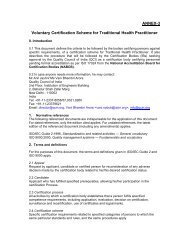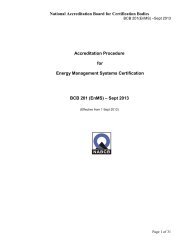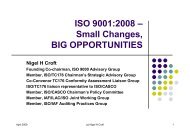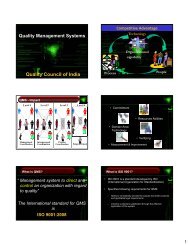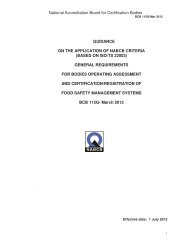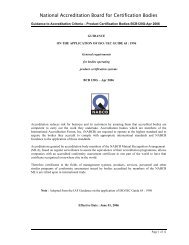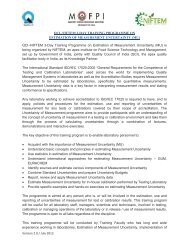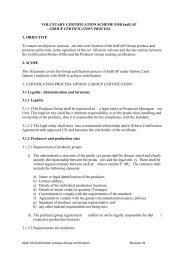Accreditation Procedure - Quality Council of India
Accreditation Procedure - Quality Council of India
Accreditation Procedure - Quality Council of India
Create successful ePaper yourself
Turn your PDF publications into a flip-book with our unique Google optimized e-Paper software.
National <strong>Accreditation</strong> Board for Certification BodiesBCB 201(ISMS) – April 2014<strong>Accreditation</strong> <strong>Procedure</strong>forInformation Security Management SystemsCertification BodiesBCB 201 (ISMS) – April 2014(Effective from 1 April 2014)Page 1 <strong>of</strong> 30
National <strong>Accreditation</strong> Board for Certification BodiesBCB 201(ISMS) – April 2014ContentsContents _______________________________________________ 2Introduction ____________________________________________ 41.0 Application for <strong>Accreditation</strong> _______________________ 42.0 Criteria for <strong>Accreditation</strong> ___________________________ 62.1 Adoption <strong>of</strong> Criteria ______________________________ 62.2 Amendment to the Criteria _________________________ 62.3 Communication <strong>of</strong> amendments to the Criteria _________ 63.0 Conditions for <strong>Accreditation</strong> ___________________________ 73.1 Granting <strong>of</strong> <strong>Accreditation</strong> ___________________________ 73.2 Maintaining <strong>of</strong> <strong>Accreditation</strong> _________________________ 83.3 Suspension <strong>of</strong> <strong>Accreditation</strong> _____________ 83.4 Withdrawal <strong>of</strong> <strong>Accreditation</strong> _________________________ 94.0 Assessment ______________________________________ 94.1 Preparation <strong>of</strong> Assessment __________________________ 94.2 Identification <strong>of</strong> Assessment Team ____________________ 104.3 Assessment Process _______________________________ 104.3.1 Assessment Plan ____________________________ 104.3.2 Initial Assessment ___________________________ 114.3.3 Assessment Report __________________________ 124.3.4 Time period for assessment process _____________ 145.0 <strong>Accreditation</strong> Decision ______________________________ 146.0 <strong>Accreditation</strong> Documents ____________________________ 147.0 Maintaining <strong>Accreditation</strong> ___________________________ 157.1 Surveillance Assessment ______________________ 157.2 Other Surveillance Assessment_____________________ 167.3 Reassessment ______________________________ 168.0 Suspension & Withdrawal <strong>of</strong> <strong>Accreditation</strong> _____________ 178.1 Decision on Suspension & Withdrawal <strong>of</strong> <strong>Accreditation</strong> 178.2 Suspension <strong>of</strong> <strong>Accreditation</strong> ___________ 178.3 Withdrawal <strong>of</strong> <strong>Accreditation</strong> _____________________ 17Page 2 <strong>of</strong> 30
National <strong>Accreditation</strong> Board for Certification BodiesBCB 201(ISMS) – April 2014Contents (contd.)8.4 Public information <strong>of</strong> suspension and withdrawal _____ 189.0 Non Conformities and Corrective Actions ______________ 1810.0 Change in the status <strong>of</strong> the Certification Body __________ 1911.0 Fee payable for the accreditation process & Annual Fee _ 2012.0 Complaints ______________________________________ 2013.0 Appeals and Disputes _____________________________ 2114.1 Appeals _______________________________________ 2114.2 Disputes ________________________________________ 2214.0 Publishing <strong>of</strong> the Information for Public ______________ 2215.0 Confidentiality and Disclosure _______________________ 2216.0 Obligations <strong>of</strong> the Certification Body__________________ 22Annex 1 ______________________________________________ 23Annex 2 _______________________________________________ 24Annex 3 _______________________________________________ 25Annex 4 _______________________________________________ 27Annex 5 _______________________________________________ 28Annex 6 _______________________________________________ 29Amendment record ______________________________________ 30Page 3 <strong>of</strong> 30
IntroductionNational <strong>Accreditation</strong> Board for Certification BodiesBCB 201(ISMS) – April 2014This document defines the procedure that has to be followed by the organizations seekingaccreditation and also accredited organizations for Information Security Management Systems(ISMS) Certification. The general information is contained in this procedure. The Board, onrequest, will provide any specific information required by the organizations.The other applicable procedures and information that are mandatory for the new applicant andthe accredited organizations like Use <strong>of</strong> Logo, Appeals procedures, Fee schedule etc. areprovided along with the application pack.1.0 Application for accreditation1.1 NABCB Board has decided to provide accreditation services to Certification/InspectionBodies established as legal entities within the SAARC nations. It is expected that the bodiesapplying for accreditation would be registered entities as per applicable laws within theireconomies can be sued in their own names. Any exception regarding legal status would be madeonly a specific decision <strong>of</strong> the Board keeping in view the legal provisions in the economy in whichthe certification body is established as a legal entity.1.2 Certification bodies interested to get accredited by the Board for their certification systemcan obtain the application form, BCB: F 001 (BCB: F 001a for renewal <strong>of</strong> accreditation) bysending a request to the Board along with the fee as per schedule. On receipt <strong>of</strong> the request andthe fee for application, NABCB will forward the application package to the applicant. Applicationsin any other format are not accepted.1.3 The application package includes the latest copies <strong>of</strong> the following documents:a) Application Form BCB: F001b) Fee Schedule BCB: F002c) Criteria for accreditation for ISMSd) <strong>Procedure</strong>s for <strong>Accreditation</strong> (BCB 201(ISMS)), use <strong>of</strong> accreditation mark (BCB 202) &Complaints, Disputes and Appeals (BCB 203)e) A copy <strong>of</strong> the accreditation agreement BCB: F003f) A blank copy <strong>of</strong> the Cross reference matrix for ISO/IEC 17021 (BCB: F026)1.4 Any additional explanation needed by the applicant is provided by the Director/CEO onbehalf <strong>of</strong> the Board, on receipt <strong>of</strong> a specific request for the same, including necessaryexplanations on the specific schemes <strong>of</strong> accreditation that are covered under certification/registration system1.5 Before applying for accreditation, the applicant body must have met the followingconditions:a. Operated the certification process for at least 6 months and granted at least twocertifications for new applicants and one certification for applicant who is alreadyaccredited for ISO 17021 by NABCB and is seeking accreditation for ISMS asadditional accreditation including the decision making process. This is necessaryto assess the ability <strong>of</strong> the CB to carry out the certification process as per thedocumented systemb. Carried out minimum one internal audit against the applicable criteria <strong>of</strong>accreditation and one management review and held one meeting <strong>of</strong> theimpartiality committee for the documented <strong>Quality</strong> system prepared as perISO/IEC 17021c. Conducted at least one meeting <strong>of</strong> the Impartiality CommitteePage 4 <strong>of</strong> 30
National <strong>Accreditation</strong> Board for Certification BodiesBCB 201(ISMS) – April 20141.6 The completed application form for accreditation has to be duly signed by the authorizedrepresentative/s <strong>of</strong> the organization seeking accreditation and forwarded to the Board along withthe application fee given in the fee schedule. The Board reserves the right to seek information onthe antecedents <strong>of</strong> the owners / those managing certification activities before deciding to acceptthe application for further processing. Adverse decision <strong>of</strong> the Board would be communicated withreasons for rejecting the application. The applicant can appeal against such decision. Theapplication fee is non refundable except when the application is rejected by the Board. Normallythe receipt <strong>of</strong> the application would be communicated within a week <strong>of</strong> receipt.Note 1 Evidence <strong>of</strong> the documents and records relating to the completion <strong>of</strong> internal audit andManagement review are to be submitted along with the application package or are madeavailable electronicallyNote 2 In case the certification body is accredited by NABCB, the organizations that werecertified prior to the assessment <strong>of</strong> NABCB may be issued NABCB accredited certificates subjectto a clear demonstration <strong>of</strong> compliance to NABCB accreditation criteria and seeking approval forthe same.1.7 The applicant must also enclose the required information and documents as specified inthe application form.1.8 The application is reviewed by the Board secretariat for completeness, clarity <strong>of</strong>accreditation requirements and the capability <strong>of</strong> the Board to provide the services. Any mismatchis clarified and the outcome <strong>of</strong> the review is communicated to the applicant regarding acceptance<strong>of</strong> the application for further processing, or to complete any further requirements identified duringthe review.1.9 In case the application is accepted for further processing, a formal quotation is sent forcarrying out the assessment <strong>of</strong> the applicant body based on the fee schedule.1.9.1, NABCB would publish it in its newsletter / website, information about new applications foraccreditation, for information and feedback from the industry / other stakeholders. In case anyfeed back from industry or stakeholders calls for a review by the Board, the required formalitiesshall be completed before further processing <strong>of</strong> the application.1.10 Further processing <strong>of</strong> application shall be taken up on receipt <strong>of</strong> acceptance <strong>of</strong> thequotation and confirmation that the “agreement for accreditation (BCB 003)” is acceptable.1.11 If a preliminary visit is requested by the applicant body, the NABCB Secretariat shallorganize the same after obtaining the acceptance <strong>of</strong> the initial visit fee by the applicant body.Such a visit would solely be for the purpose <strong>of</strong> gaining a better understanding <strong>of</strong> the operations <strong>of</strong>the CB and for the CB to better understand the accreditation process and clarify the expectations<strong>of</strong> NABCB as regards the requirements <strong>of</strong> the standard. The visit may result in communication <strong>of</strong>findings to the CB. Such a visit would not result in any decrease in the mandays for the initialassessment.1.12 Any Certification Body that is registered as a legal entity in <strong>India</strong> / other SAARC nationsshall be eligible for applying for the accreditation. However, locations outside the SAARC nationswould be included in the accreditation process depending on the nature <strong>of</strong> activities carried out inthose locations.1.13 Assessment at foreign locationsNABCB shall reserve the right to take the assistance <strong>of</strong> local IAF MLA members for assessmentsat foreign locations. The fee for such assessments shall depend on the fee structure <strong>of</strong> the localaccreditation body. The applicant / accredited certification body shall have the normal right toappeal against a specific assessor for reasons <strong>of</strong> conflict <strong>of</strong> interest. If the certification body doesPage 5 <strong>of</strong> 30
National <strong>Accreditation</strong> Board for Certification BodiesBCB 201(ISMS) – April 2014not prefer to involve such local accreditation body, then the reasons for the same would have tobe clearly indicated in writing. NABCB reserves the right to share such information with theconcerned accreditation body / IAF.2.0 Criteria for accreditation2.1 Adoption <strong>of</strong> Criteria2.1.1 The Board shall adopt and document the accreditation criteria for certification bodies basedon international standards and guides, supported by the guidance documents released by theInternational <strong>Accreditation</strong> Forum.2.1.1.1 Definitions <strong>of</strong> various terms related to conformity assessment shall be as given in ISO17000 and ISO 17011 (Annex 1).2.1.2 The application package includes the documented Criteria except for copyrightedstandards.2.1.2.1 The criteria documents, that have been adopted directly from international standards andare covered by copyright laws, are not given as part <strong>of</strong> the application package. For suchdocuments only the reference number and issue level is given. In case <strong>of</strong> need, the applicantbodies are to procure such documents from the national standards body, Bureau <strong>of</strong> <strong>India</strong>nStandards (BIS), International Organization for Standardization (ISO) or through other sources.2.2 Amendment to the Criteria2.2.1 The amendment to the Criteria shall be based on the nature <strong>of</strong> change required .TheCriteria <strong>of</strong> accreditation and the guidance documents shall be taken up for amendment based onfollowing conditions individually or severallya) Any change in the International standards and guidesb) Any change in the IAF Guidance documents for implementation <strong>of</strong> internationalstandards and guidesc) Significant feedback from the Peer Review assessment team that warrants amendmentd) Critical feedback from the implementation <strong>of</strong> the criteriae) Any other reason as deemed fit by the Board or the Technical Committee2.2.2 The Board shall approve the amended criteria after completion <strong>of</strong> any one or more <strong>of</strong> theconsultative processa) Seek the advice <strong>of</strong> the Technical Committee orb) A representation <strong>of</strong> certification bodies before approval <strong>of</strong> the amendment.c) Seek public comments on the proposed changes through the Members <strong>of</strong> the Boardand other representative bodies as the Board may deem fit.2.2.3 The issue status <strong>of</strong> the Criteria documents shall be identified by the month and / or year <strong>of</strong>the issue.2.3 Communication <strong>of</strong> changes to the Criteria2.3.1 Any change in the criteria shall be notified to the accredited / applicant certification bodiesby registered (AD) post / other means and a suitable time frame shall be given for implementingthe modified criteria. Any transition policy announced by IAF would be adopted by the Board andcommunicated to the CBs. The accredited certification bodies shall communicate their objection,if any, in writing by registered post / other means within 30 days <strong>of</strong> the receipt <strong>of</strong> the amendedcriteria. If the communication is not received within 30 days, it will be presumed that theaccredited certification body is willing to adopt the changed criteriaPage 6 <strong>of</strong> 30
National <strong>Accreditation</strong> Board for Certification BodiesBCB 201(ISMS) – April 20142.3.2 The implementation <strong>of</strong> the changed criteria shall be verified during the surveillanceassessment <strong>of</strong> each certification body. . In the event <strong>of</strong> any major change in the criteria, theBoard reserves the right to carryout an additional assessment and the fee <strong>of</strong> such assessmentvisit shall be borne by certification body. The fee for such additional assessment shall have to bepaid in advance.2.3.3 In the event that an accredited certification body is not willing to adopt the changed criteria,it is allowed to opt out <strong>of</strong> the accreditation scheme and the accreditation is withdrawn with effectfrom the date <strong>of</strong> the implementation <strong>of</strong> revised criteria. The certification body in such cases shallforfeit their right to get the refund <strong>of</strong> the paid fees.3.0 Conditions for <strong>Accreditation</strong>3.1 Granting <strong>of</strong> <strong>Accreditation</strong>3.1.1 The accreditation is granted to an applicant on completion <strong>of</strong> assessment as per theprovisions <strong>of</strong> Clause 4 <strong>of</strong> this procedure and after the following conditions has been met by theapplicant bodya)The applicant has the certification system (activities including contracting for certification,audit planning and conduct <strong>of</strong> audit, decision making) in operation for at least 6 monthsbefore the <strong>of</strong>fice assessment is taken up.b)The applicant meets the criteria <strong>of</strong> accreditation and all non-conformities found against thecriteria <strong>of</strong> accreditation during assessment have been closed to the satisfaction <strong>of</strong> theBoard in accordance with the guidelines on the subjectc)There are no adverse reports/information / complaints with the Board about the applicantregarding the quality and effectiveness <strong>of</strong> implementation <strong>of</strong> certification system as per thecriteria <strong>of</strong> the Board.d)The certified clients <strong>of</strong> the applicant body are satisfied by the conduct <strong>of</strong> the applicant bodyand its certification system. NABCB may request feedback from selected clients <strong>of</strong> thecertification body / publicize receipt <strong>of</strong> application and seek a feedback from stakeholdersNote: NABCB shall obtain on regular basis, through appropriate mechanism, feedback fromfew <strong>of</strong> the certification body clients to assess the integrity and compliance aspects <strong>of</strong> thecertification body.e)The applicant body has paid all the outstanding dues.f)The Initial accreditation shall be for a period <strong>of</strong> 3 years. Subsequent renewals are for aperiod <strong>of</strong> 4 years subject to satisfactory operation <strong>of</strong> accredited certification scheme andreasonable number <strong>of</strong> NABCB accredited certificates being issued by the CB3.1.2 In the event <strong>of</strong> any adverse issue arising from the reasons specified at points c) and d) <strong>of</strong>3.1.1, the applicant body will be given an opportunity to explain its position in writing to the Boardand present its case in person to the Technical Committee or the accreditation committee. Thefinal decision shall be taken in respect <strong>of</strong> granting <strong>of</strong> accreditation on the basis <strong>of</strong> facts and theresults <strong>of</strong> such presentation3.1.3, NABCB would publish it in its newsletter/website, grant <strong>of</strong> any new accreditation, forinformation and feedback from the industry / other stakeholders.Page 7 <strong>of</strong> 30
National <strong>Accreditation</strong> Board for Certification BodiesBCB 201(ISMS) – April 20143.2 Maintaining <strong>Accreditation</strong>3.2.1 The certification body shall comply with the following, individually or severally. Under theseconditions the accreditation given to a certification shall be maintained for three years / fouryears.a)The accredited body continues to meet the criteria <strong>of</strong> accreditation and all non-conformitiesfound against the criteria <strong>of</strong> accreditation during surveillance assessment have beenclosed to the satisfaction <strong>of</strong> the Board as per laid down criteria.b)There are no adverse reports / information / complaint with the Board about the applicantregarding the implementation <strong>of</strong> certification system as per the criteria laid down by theBoard.c)The certified suppliers <strong>of</strong> the applicant body are satisfied by the conduct <strong>of</strong> the applicantbody and its certification systemd)The accredited body has paid all the outstanding dues3.2.2 In the event <strong>of</strong> any adverse issue arising from the reasons specified at points b) and c) <strong>of</strong>3.2.1, the accredited certification body shall be given an opportunity to explain its position inwriting to the Board and present its case in person to the accreditation committee. The finaldecision shall be taken in respect <strong>of</strong> maintenance <strong>of</strong> the accreditation on the basis facts and theresults <strong>of</strong> such presentation3.3 Suspension <strong>of</strong> <strong>Accreditation</strong>The certification body shall be subject to suspension <strong>of</strong> accreditation either fully or partially basedon the following conditions individually or severallya) No/ineffective corrective action in response to the non-conformities observed duringsurveillance assessment or reassessment.b) Non payment <strong>of</strong> outstanding duesc) Any major change has taken place in the legal status, ownership, impartiality etc.without information to the Boardd) Any wilful misuse <strong>of</strong> the logo <strong>of</strong> the Boarde) Any wilful miss-declaration in the application formf) Wilful non-compliance to the accreditation agreementg) Inability or unwillingness to ensure compliance <strong>of</strong> the organizations, certified by theaccredited body, to the applicable standards.h) Excessive and or serious complaints against the certification system <strong>of</strong> the accreditedcertification body.i) Evidence <strong>of</strong> lack over control over the certification process / wilful by passing <strong>of</strong>certification proceduresj) Evidence <strong>of</strong> unethical certification practices including providing incorrect information toNABCB, faking <strong>of</strong> certification recordsk) Non-availability <strong>of</strong> resources in some <strong>of</strong> the technical areas covered underaccreditationl) Any other condition deemed appropriate by the accreditation committee3.3.1 A notice citing reasons and intention to suspend shall be sent to the CB inviting responsewithin 15 days.3.3.2 The accredited certification body shall be given an opportunity to explain its position inwriting to the Board and present its case in person to the Technical committee or theaccreditation committee. The final decision shall be taken in respect <strong>of</strong> Suspension <strong>of</strong><strong>Accreditation</strong> on the basis or facts and the results <strong>of</strong> such presentation.3.3.3 Notwithstanding the above provision for a representation by the CB, the accreditationcommittee may decide to suspend accreditation if there is sufficient evidence <strong>of</strong> wilfulPage 8 <strong>of</strong> 30
National <strong>Accreditation</strong> Board for Certification BodiesBCB 201(ISMS) – April 2014misrepresentation <strong>of</strong> facts or wilful non compliance to accreditation criteria. The period <strong>of</strong>suspension shall be formally communicated as per the criteria laid down by the Board3.3.4 The fact that the accreditation <strong>of</strong> the certification body has been suspended ; would bepublished in newsletters / website for information and feedback from the industry / otherstakeholder3.4 Withdrawal <strong>of</strong> <strong>Accreditation</strong>3.4.1 The certification body shall be subject to withdrawal <strong>of</strong> accreditation based on the followingconditions individually or severallya) If an accredited body wilfully relinquishes its accredited statusb) If the non-conformities are not appropriately addressed in spite <strong>of</strong> suspension for a periodnot more than six monthsc) If no action is taken by the accredited body in response to the suspension on any othergrounds.d) Complaints are received about the certification process / certified organizations andestablished to be based on facts3.4.2 A notice <strong>of</strong> the intention to withdraw accreditation and citing reasons shall be sent to theCB. The CB shall respond within 15 days.3.4.3 The accredited certification body shall be given an opportunity to explain its position inwriting to the Board and present its case in person to the Technical committee or any otheraccreditation committee. The final decision shall be taken in respect <strong>of</strong> Withdrawal <strong>of</strong><strong>Accreditation</strong> on the basis <strong>of</strong> facts and the results <strong>of</strong> such presentation3.4.4 The withdrawal <strong>of</strong> <strong>Accreditation</strong> shall be formally communicated as per the criteria laid downby the Board.3.4.5 NABCB would publish information about any withdrawal <strong>of</strong> accreditation in its newsletter /website / news papers for information <strong>of</strong> the industry / other stakeholders4.0 AssessmentThe assessment shall be for generic competence <strong>of</strong> the body in operating a sound certificationsystem.4.1 Preparation for the Assessment4.1.1 The NABCB Secretariat prepares a draft assessment programme as below for the initialassessment:a) assessment <strong>of</strong> the documents,b) assessment <strong>of</strong> <strong>of</strong>fice <strong>of</strong> the applicant including any branch <strong>of</strong>fice/sub-contractors andc) witnessing <strong>of</strong> on-site audits being carried out by the applicant.Page 9 <strong>of</strong> 30
National <strong>Accreditation</strong> Board for Certification BodiesBCB 201(ISMS) – April 2014The normal assessment duration for each stage <strong>of</strong> assessment is given at Annex 2. The draftprogramme may be prepared in stages as mentioned above depending on the informationsupplied. Any clarifications needed shall be provided in advance for finalizing assessment plan; -ifnecessary, the same shall be further verified as part <strong>of</strong> the <strong>of</strong>fice assessment.4.1.2 Each <strong>of</strong> the branch/sub-contractors <strong>of</strong>fice from where key activities (policy making,development <strong>of</strong> procedures, contract review, audit plan approval, surveillance planning andmonitoring, auditor monitoring and decision making) are performed shall be selected for theinitial assessment.4.1.3 The draft programme shall be discussed with authorized personnel <strong>of</strong> the certification bodyto ensure an effective assessment plan at each stage4.2 Appointment <strong>of</strong> the Assessment Team4.2.1 The assessment team, consisting <strong>of</strong> a Team Leader and the members, is identified by theDirector/CEO from the pool <strong>of</strong> assessors and experts. The assessment team for each stage <strong>of</strong>the initial assessment normally consists <strong>of</strong> two members and the team for witness assessmentwill normally have as many members as the audit team <strong>of</strong> the applicant body. In case the needfor an expert in the NABCB assessment team results in exceeding the number <strong>of</strong> certificationbody auditors then NABCB bear all expenses associated with the expert.4.2.2 The names <strong>of</strong> the members <strong>of</strong> the audit team, along with their CV and details <strong>of</strong> anycurrent affiliations, shall be communicated to the applicant body giving them a time <strong>of</strong> two weeksto raise any objection against the appointment <strong>of</strong> any <strong>of</strong> the team members. Any objection by theapplicant body against any <strong>of</strong> the team members must be accompanied in writing with adequategrounds for the objection. The Director/CEO <strong>of</strong> the Board will evaluate the objection and decidewhether to change the team member or to over rule the objection raised by the applicant body.4.2.3 The decision <strong>of</strong> the Board on the number <strong>of</strong> assessors for witness assessment will be final.4.2.4 The team members are asked to commit that they do not have relationship direct/indirectwith the applicant body or competitive position between themselves or their organization and theCB to be assessed that can affect the objectivity <strong>of</strong> the audit. The assessment team is thenformally constituted and appointed.4.2.5 Efforts are made to ensure that the team is kept intact throughout the initial assessmentprocess. If there is any change in the composition <strong>of</strong> the team members, the same shall becommunicated to the certification body for their acceptance.4.2.6 The team members are required to maintain confidentiality <strong>of</strong> the sensitive informationabout the operation <strong>of</strong> the applicant obtained as part <strong>of</strong> the assessment process.4.3 Assessment Process:4.3.1 Assessment Plan4.3.1.1 Based on the draft assessment plan, NABCB Secretariat prepares a detailed plan forthe following three stages <strong>of</strong> the assessmenta) Assessment <strong>of</strong> the documentation <strong>of</strong> the certification body.b) Assessment <strong>of</strong> the <strong>of</strong>fice <strong>of</strong> the certification body including branch <strong>of</strong>fices/subcontractorsc) Witness <strong>of</strong> the audit being carried out by the certification body (Please see Annex 3). Aminimum <strong>of</strong> 2 witness audits would be required before a recommendation foraccreditation is made. In case <strong>of</strong> applicant CB applying for ISMS accreditation as anPage 10 <strong>of</strong> 30
National <strong>Accreditation</strong> Board for Certification BodiesBCB 201(ISMS) – April 2014additional scheme and already having NABCB accreditation for ISO 17021, only onewitness audit is required before a recommendation for accreditation is made.4.3.1.2 The programme shall be agreed by the Director/CEO <strong>of</strong> the Board and by the applicantbody.4.3.1.3 For initial accreditation, the certification body shall provide a minimum <strong>of</strong> two/one witnessaudits prior to any recommendation for accreditation.4.3.1.4 The Leader <strong>of</strong> the assessment team, in consultation with Director/CEO NABCB, isauthorized to identify the auditors <strong>of</strong> the applicant body that his team would wish to observeduring the witness <strong>of</strong> audit by applicant body.4.3.2 Initial AssessmentThe initial assessment shall be carried out in three stages as per the assessment programme.4.3.2.1 The documents shall be verified by the assessment team leader/a member <strong>of</strong> theassessment team for compliance to the accreditation criteria as supported by the guidancedocuments. A summary report <strong>of</strong> any omissions <strong>of</strong> the criteria elements is forwarded by theassessor, as approved by the Team Leader, to the Director/CEO.4.3.2.2 The Director/CEO shall review the report from the point <strong>of</strong> established criteria andforward a copy <strong>of</strong> report to the applicant body for their comments and compliance. Depending onthe nature <strong>of</strong> comments and changes to be made to the documentation, decision regarding asecond review <strong>of</strong> documents shall be taken by the assessor / Director/CEO. The applicant CBshall be informed if a second review is needed and the time period for submission for the secondreview.4.3.2.3 If the documentation is determined to be meeting the accreditation criteria, after review<strong>of</strong> the changes made, NABCB Secretariat may seek evidence <strong>of</strong> implementation <strong>of</strong> changes tothe system by the applicant body. NABCB Secretariat may also advise the applicant body tosubmit the required number <strong>of</strong> sets <strong>of</strong> the manual and procedures for the assessors.4.3.2.4 The schedule for the <strong>of</strong>fice assessment shall be agreed by the Director/CEO with theapplicant body and the assessment team carries out the assessment <strong>of</strong> the implementation <strong>of</strong> thequality manuals and procedures <strong>of</strong> the applicant body in the head <strong>of</strong>fice <strong>of</strong> the applicant body andif necessary at other <strong>of</strong>fice sites / sub contractors included in the accreditationapplication/assessment program.4.3.2.5 In case information collected during the <strong>of</strong>fice assessment requires inclusion <strong>of</strong> otherlocations in the assessment program, the applicant shall be informed and the assessmentprogram shall be modified to cover such locations. Subsequent monitoring at these <strong>of</strong>fices / newlocations shall depend on the nature <strong>of</strong> activities carried out by them and the extent <strong>of</strong> controldemonstrated by the applicant CB.4.3.2.6 The branch <strong>of</strong>fices / sub-contractors carrying out activities like contract review, auditorqualification, audit planning, surveillance planning, monitoring <strong>of</strong> auditors, decisions oncertification shall be included in the assessment program. All such <strong>of</strong>fices / sub-contractors shallbe covered in the assessment program during an accreditation cycle.4.3.2.7 During the assessment or on demand at any time, the applicant / accredited body shallprovide unrestricted access to the documents that pertain to the certification. Access shall also tobe provided to the records <strong>of</strong> the complaints, appeals and disputes along with corrective actionand the method <strong>of</strong> verifying the effectiveness <strong>of</strong> the corrective actions.Page 11 <strong>of</strong> 30
National <strong>Accreditation</strong> Board for Certification BodiesBCB 201(ISMS) – April 20144.3.2.8 The non-conformities observed during the <strong>of</strong>fice assessment shall be explained to theapplicant body and given in NABCB designated format for corrective action as well as anypotential preventive action at the end <strong>of</strong> the assessment. The applicant shall respond within 30days with the corrective action plan. The time for the corrective action completion shall be agreedto by the assessment team leader and the authorized personnel <strong>of</strong> the applicant body as per theGuidelines laid down on this aspect by the Board (Pl see Clause 9 <strong>of</strong> this procedure).4.3.2.9 The team leader shall decide, at this stage, whether to await completion <strong>of</strong> thecorrective action or to proceed with the witness <strong>of</strong> the site audit scheduled to be carried out by theapplicant. The Team leader shall send a report to the Director/CEO, including details <strong>of</strong> thewitness audit plan, as per the Guidelines <strong>of</strong> the Board4.3.2.10 The team, nominated by NABCB Secretariat, shall carry out the witness assessment asper the assessment plan. The assessment shall cover either the initial / renewal audits conductedby the applicant body. Two surveillance audits may also be considered for witnessing in lieu <strong>of</strong> aninitial / renewal audit, with the approval <strong>of</strong> the Director/CEO. The applicant shall include allproduction and other processes specific to the technical area. All the witness audits, collectively,shall demonstrate the ability <strong>of</strong> the applicant to audit all the requirements <strong>of</strong> the applicablestandard and the specific technical areas for which the witness audit is plannedNote: For all witness audits, the Certification Body shall provide details <strong>of</strong> contract reviewincluding inputs received for contract review, document review report, and report <strong>of</strong> stage 1assessment, if applicable. The NABCB witness audit team may also ask for the documentation <strong>of</strong>the audited organization and other evidence seen by the Certification Body’s team withoutcausing undue disturbance to the audit process.4.3.2.11 The Team shall identify the non-conformities. The Team leader shall confirm that theapplicant has <strong>of</strong>fered the correct units for audits for witnessing to ensure that these units are sochosen as to demonstrate auditing <strong>of</strong> the basic industry processes.4.3.2.12 A meeting shall be held on completion <strong>of</strong> witness assessment and the applicant shall beexplained and provided with documented copy <strong>of</strong> the non-conformities observed for correctiveaction as per the Guidelines established by the Board. The team also provides an opportunity forthe applicant body to ask any question about the findings and its basis during the meeting.4.3.3 Assessment Report4.3.3.1 The assessment team shall prepare a report at each stage <strong>of</strong> the assessment –<strong>of</strong>fice assessment, branch <strong>of</strong>fice assessment, witness audits. Non-conformities and observations,if any, shall be handed over to the certification body representative at the end <strong>of</strong> eachassessment. The report at each stage <strong>of</strong> assessment shall be sent by the NABCB assessmentteam within 7 days <strong>of</strong> the assessment to the certification body for their agreement. If nocomments are received within a week then the report is considered to be acceptable to thecertification body and is deemed as final. The NABCB AT shall try to resolve any commentsreceived on the report within a period <strong>of</strong> 10 days and shall submit the report at the end <strong>of</strong> thisperiod along with any unresolved comments from the certification body. NABCB Secretariatwould coordinate, as needed,For any witness audits, the certification bodies shall provide the witness audit report within aweek <strong>of</strong> the audit and in case the report is not provided then the NABCB assessment team wouldrecord the same in their report <strong>of</strong> the witness audit and finalise its witness audit report within aweek. NABCB assessment team may raise non-conformities / observations later, on the basis <strong>of</strong>any report submitted by the certification body. If the CB fails to submit its audit report in time, thenany information contained in the report may not be accepted as evidence for any contention bythe CB against observations by the NABCB assessment team.Page 12 <strong>of</strong> 30
National <strong>Accreditation</strong> Board for Certification BodiesBCB 201(ISMS) – April 2014After completion <strong>of</strong> various stages <strong>of</strong> assessments the team leader shall prepare a report <strong>of</strong> allthe aspects <strong>of</strong> the assessment <strong>of</strong> the <strong>of</strong>fice and witness audits. The assessment report is made inthe following parts:a) The non-conformities observed during various stages <strong>of</strong> the assessment and actionstaken by the certification body on the non-conformitiesb) A report indicating the level <strong>of</strong> conformity <strong>of</strong> the certification body’s managementsystem against the NABCB accreditation requirementsd) Recommendations <strong>of</strong> the NABCB assessment teamThe team leader shall conduct a virtual closing meeting through emails (or onsite if agreed to bythe certification body) to communicate the final decision and recommendations. Any unresolvedissues shall be referred to the NABCB secretariat.4.3.3.2 The report shall be prepared as per the laid down Guidelines and criteria by the teamleader/team members in the established formats listing the level <strong>of</strong> compliance to the requirement<strong>of</strong> the accreditation criteria <strong>of</strong> the Board.4.3.3.3 The NABCB Secretariat shall review the report to ensure that the laid down criteria areaddressed correctly and shall make changes in recommendations as needed based on theNABCB Board’s accreditation criteria. Any revised report shall be sent to the applicant body alongwith reasons for any change.4.3.3.4 At any stage <strong>of</strong> the assessment process whether there is a need for a full or partialreassessment or a written declaration <strong>of</strong> compliance in response to the non-conformitiesobserved is adequate shall be communicated to the applicant body by the Director/CEO <strong>of</strong> theBoard after obtaining the relevant supportive facts relating to assessment from the leader <strong>of</strong> theassessment team.4.3.3.5 In case the report sent to the applicant body contains any difference from theinformation presented to the applicant body by the assessment team at the closing meeting (<strong>of</strong>each stage <strong>of</strong> assessment), the same is highlighted and the explanation <strong>of</strong> the differences shallbe enclosed.4.3.3.6 After verifying the documents and records submitted by the applicant body on all thenon-conformities that have been closed by the applicant as per laid down guidelines <strong>of</strong> the Board,the Team leader shall prepare the final report <strong>of</strong> the assessment report including the details onthe corrective actions taken by the applicant body and shall include the recommendation <strong>of</strong> theteam. This report shall be given to the Director/CEO. The report shall be verified forcompleteness, by the Director/CEO, with respect to guidelines on the subject and shall bepresented to the accreditation committee for its decision on the applicant getting accreditation.4.3.3.7 The process <strong>of</strong> closing the non-conformities and verification shall be completed in thespecified time. If the applicant body delays the process <strong>of</strong> acceptable corrective action beyondthe limits specified by the Board, the Board shall have the right to reject the application. The feespaid by such applicant will be forfeited.4.3.3.8 Wherever needed, to support the competency <strong>of</strong> the applicant certification body, theapplicant may submit the documents and records <strong>of</strong> assessments undertaken on the applicant byother IAF MLA Members. Director/CEO NABCB, shall ensure a detailed review, on a case-tocasebasis, and place a report on the same to <strong>Accreditation</strong> Committee. The Committee shalldecide on the grant accreditation based on such reports.Page 13 <strong>of</strong> 30
National <strong>Accreditation</strong> Board for Certification BodiesBCB 201(ISMS) – April 2014.Appropriate Guidelines on this subject shall be laid down for the use <strong>of</strong> assessment Team as wellapplicant bodies. In case <strong>of</strong> any difference in interpretation, the Board decision shall be final andbinding on the applicant body (please see Annex 4 for details)4.3.4 Time Period for assessment process4.3.4.1 A typical time line for the accreditation process is given in Annex 5. In the event thatthe process is not completed within two years, due to delays / deficiencies on the part <strong>of</strong> theapplicant, an extension <strong>of</strong> one year may be given depending on the results <strong>of</strong> past assessments.In such cases the assessment process shall begin afresh and shall be completed in one year.Applications pending over 3 years shall be reviewed by the Board for appropriate action includingclosure..5.0 <strong>Accreditation</strong> Decision5.1 The <strong>Accreditation</strong> Committee is responsible for taking decision on granting, maintaining,suspending, reducing or withdrawing <strong>of</strong> <strong>Accreditation</strong>. The Board criteria shall ensure that themembers <strong>of</strong> the <strong>Accreditation</strong> Committee are not involved in the assessment and also have hadno relationship for the last two years with the applicant body under consideration that caninfluence their decision on accreditation.5.2 The reports are forwarded to the accreditation committee for the decision on accreditationonly after receipt <strong>of</strong> the fee for the activities associated with the assessment process till date.5.3 <strong>Accreditation</strong> committee shall work on the principle <strong>of</strong> “unanimous decision “. The decisionshall not be put on vote .The Head <strong>of</strong> the Committee shall be responsible for coordinating andaddressing the issues raised by the members. The Head <strong>of</strong> the committee shall have the right tocall for any other assessor / experts / staff for clarifying any <strong>of</strong> the issue that is under discussion.The persons so called for clarification shall not take part in the decision <strong>of</strong> the accreditation.5.4 The decisions <strong>of</strong> the accreditation committee shall be based on the assessment reportand other relevant information based on interaction <strong>of</strong> the Director/CEO NABCB and theassessment team with the certification body and the market reputation as obtained by the Board.The accreditation Committee in its capacity shall have the right to ask for any further clarificationson the report and information submitted on the applicant’s certification process and the applicantshall not refuse to present such information.6.0 <strong>Accreditation</strong> documents6.1 The accreditation committee shall decide to grant accreditation to the applicant body, onlyafter the applicant body has met all the conditions specified by the Board, Two copies <strong>of</strong> theaccreditation agreement shall be signed by the applicant and the applicant shall ensure that therelevant fees are paid.6.2 On receipt <strong>of</strong> the signed agreement and the fee as per the invoice, a set <strong>of</strong> accreditationdocuments shall be issued to the applicant body along with the artwork <strong>of</strong> the accreditation mark<strong>of</strong> the Board.6.3 The accreditation certificate in the standard template shall include the NBACB logo, thename <strong>of</strong> the certification body, address <strong>of</strong> the premises <strong>of</strong> the certification body from where keyactivities are performed, accreditation number, the scheme <strong>of</strong> accreditation, effective date <strong>of</strong>grant <strong>of</strong> accreditation and the date <strong>of</strong> expiry <strong>of</strong> the certificate (BCB F018)Page 14 <strong>of</strong> 30
National <strong>Accreditation</strong> Board for Certification BodiesBCB 201(ISMS) – April 20146.4 The initial accreditation certificate shall be valid for three years and the date <strong>of</strong> issue andvalidity is indicated on the certificate.7.0 Maintaining <strong>Accreditation</strong>7.1 Surveillance Assessment7.1.1 To ensure that each <strong>of</strong> the certification body accredited by the Board continues to complywith the accreditation requirements, a surveillance assessment (at the <strong>of</strong>fice) shall be carried outannually. The surveillance assessment shall be consistent with the initial assessment andincludes <strong>of</strong>fice assessment, locations performing key activities, including foreign locations andwitness <strong>of</strong> site audit by the accredited body. The number <strong>of</strong> locations included in the surveillanceassessment would normally be the square root <strong>of</strong> the total number <strong>of</strong> locations ensuring that alllocations are covered in an accreditation cycle as a minimum.7.1.2 The witness audit program (Annex 3, Clause 4.5) shall be based on audit resourcesavailable to the certification body, number <strong>of</strong> accredited certificates issued, spread <strong>of</strong> locationsand the extent <strong>of</strong> control demonstrated by the certification body and observations <strong>of</strong> the <strong>of</strong>ficeassessment. Specific organizations or auditors may be chosen for witnessing. A plan for witnessaudits shall be communicated to the accredited certification body as per laid down guidelines <strong>of</strong>the board. The provisions <strong>of</strong> clause 4.2 would apply as regards the number <strong>of</strong> NABCB assessors/ experts for witness audits.7.1.3 The surveillance assessment shall be completed within 12 months from the date <strong>of</strong> initialaccreditation. However, the accredited certification body, for valid reasons may seek apostponement <strong>of</strong> the assessment for a maximum period <strong>of</strong> three months. For deferring thesurveillance, the certification body shall give written justification and shall obtain the consent <strong>of</strong>Director/CEO, NABCB. It shall be ensured by the Director/CEO NABCB that the gap betweensurveillance assessments shall not exceed 15 months. The non-conformity reports and asummary assessment report <strong>of</strong> each <strong>of</strong> the surveillance assessment shall be forwarded to theaccredited certification body for taking corrective action and preventive actions as per the laiddown criteria for the maintenance <strong>of</strong> accreditation. .7.1.4 In the event <strong>of</strong> any critical and or major non-conformity that can affect the certificationprocess, the Director/CEO <strong>of</strong> the Board shall inform the accredited certification body and shall callfor a time bound corrective action plan. The decision for an additional surveillance visit to verifythe implementation <strong>of</strong> the corrective action plan as committed by the accredited body shall betaken by the Director/CEO <strong>of</strong> the Board in consultation with the Team leader <strong>of</strong> the assessmentteam. Such decision shall be binding on the accredited certification body. The cost <strong>of</strong> theadditional surveillance shall be borne by the accredited certification body. In the event accreditedcertification body has not shown evidence <strong>of</strong> completion <strong>of</strong> the corrective action agreed as percommitted time period, Director/CEO NABCB shall prepare a status report and submit it alongwith the assessment report to the accreditation committee for further decision on suspension orreduction or withdrawal <strong>of</strong> accreditation.7.1.5 The surveillance assessment reports shall be presented to the accreditation committee forconsideration and decision regarding maintaining or suspension (partial full) <strong>of</strong> accreditation <strong>of</strong>the certification accredited body.7.1.6 The frequency <strong>of</strong> surveillance assessments shall be increased based on the type andnature <strong>of</strong> non-conformities observed, complaints received, market feedback etc. The accreditedcertification body shall be informed <strong>of</strong> the reasons for any change in the frequency.7.2 Other Surveillance activities7.2.1 NABCB Secretariat would call for information on new certificates issued on a quarterlybasis and then may decide to seek audit reports on a random basis. The Secretariat would havePage 15 <strong>of</strong> 30
National <strong>Accreditation</strong> Board for Certification BodiesBCB 201(ISMS) – April 2014the reports reviewed and seek any clarification. If a clear deviation from the requirement <strong>of</strong> thestandard is established then such findings would be raised as non-conformities requiring theaccredited CB to respond. For the present NABCB would bear the cost <strong>of</strong> such reviews.7.2.2 Based on concerns noticed during the <strong>of</strong>fice assessment / market feedback / complaints orany other information, Director/CEO, NABCB may decide to arrange either a special assessmentat any <strong>of</strong> the CB’s <strong>of</strong>fices or visits to certified organizations. CBs shall, in their contract with theirclients provide for such visits. CBs shall be informed <strong>of</strong> any such validation visits and may join theNABCB assessor on such visits if required. CBs would be informed <strong>of</strong> the duration <strong>of</strong> such visitsand the information planned to be collected. The CB would have to bear the charges for suchassessments/visits.7.2.3 If the visits indicate satisfactory operation <strong>of</strong> accredited certification then a reduction innormal witnessing could be considered.. If however, the visits reveal unsatisfactory operation <strong>of</strong>the accredited certification scheme then NABCB Secretariat would advise actions to be takenwhich could include a special <strong>of</strong>fice assessment, intensified witnessing, witnessing at theorganization which revealed unsatisfactory operation etc. The CB would have to bear the normalassessment charges in such cases.7.2.4 CBs may opt for such validation visits in lieu <strong>of</strong> witnessing on their own. In such cases thenumber <strong>of</strong> validation visits required, duration and charges to be levied would be communicated tothe CB by NABCB secretariat in advance for acceptance. Selection <strong>of</strong> samples would be done byNABCB Secretariat.7.3 Reassessment:7.3.1 Within six months prior to completion <strong>of</strong> the accreditation term, the accredited certificationbody shall be informed about the reassessment process and the relevant application format shallbe forwarded to them.7.3.2 The reassessment shall be carried out in accordance with clause 4 to clause 6 for thepurpose <strong>of</strong> renewing the accreditation. The requirement <strong>of</strong> two/one witness <strong>of</strong> audits may bewaived <strong>of</strong>f in case there have been witness <strong>of</strong> audits during the cycle and these have beensatisfactory.7.3.3 On completion <strong>of</strong> the re-assessment, the accredited certification body shall initiate therelevant activities to take corrective actions on the observed non conformities, if any, andcomplete all actions as per the criteria <strong>of</strong> the Board to close all such non-conformities. Theassessment team shall prepare a report <strong>of</strong> all the aspects <strong>of</strong> the assessment <strong>of</strong> the <strong>of</strong>fice andwitness audit. The assessment report is made in the following parts:a) The non-conformities observed during various stages <strong>of</strong> the assessment.b) A report indicating the level <strong>of</strong> conformity to the certification body’s managementsystem against the NABCB accreditation requirements.7.3.4 Report shall be prepared as per the laid down Guidelines and criteria by the team leader /team members in the established formats listing the level <strong>of</strong> compliance to the requirement <strong>of</strong>the accreditation criteria <strong>of</strong> the Board. The Director/CEO <strong>of</strong> the Board presents the report <strong>of</strong> thesurveillance assessments, the re-assessment, and the corrective actions taken by the accreditedbody to the accreditation committee for a decision.7.3.5 If the decision by the accredited committee is to continue the accreditation, a fresh set <strong>of</strong>accreditation documents shall be issued to the accredited certification body.Page 16 <strong>of</strong> 30
National <strong>Accreditation</strong> Board for Certification BodiesBCB 201(ISMS) – April 20147.3.6 The renewal shall be for a period <strong>of</strong> 4 years subject to satisfactory operation <strong>of</strong> accreditedcertification scheme by the body and reasonable number <strong>of</strong> NABCB accredited certificates beingissued by the CB.7.3.7 If the decision <strong>of</strong> the accreditation committee is not favourable, it shall be communicatedto the accredited certification body and the accreditation is suspended for initiating theappropriate actions including any corrective action. The Board reserves the right to withdrawaccreditation without suspension based on the decision <strong>of</strong> the accreditation committee.7.3.8 All reassessment activities shall be completed prior to the expiry <strong>of</strong> accreditation. In casethere is a delay in decision-making, the accreditation shall continue, if the report <strong>of</strong> theassessment team is satisfactory. The decision <strong>of</strong> the accreditation committee shall be binding onthe accredited certification body8.0 Suspension & Withdrawal <strong>of</strong> <strong>Accreditation</strong>8.1 Decision on Suspension and Withdrawal <strong>of</strong> <strong>Accreditation</strong><strong>Accreditation</strong> Committee is authorized for taking decisions on the suspension or withdrawal <strong>of</strong>accreditation or revoking <strong>of</strong> the decision <strong>of</strong> suspension. It may impose conditions as deemedappropriate while issuing or revoking suspension.8.2 Suspension <strong>of</strong> <strong>Accreditation</strong> (Partial / full)8.2.1 In addition to the requirements specified under clause 3.3 Suspension <strong>of</strong> <strong>Accreditation</strong>(Partial or full) the following shall further apply.8.2.1.1 The certification body may seek on its own suspension <strong>of</strong> accreditation citing reasons.8.2. 2 The period <strong>of</strong> suspension shall not be more than six months. The Board shall have theright to withdraw the accreditation if the accredited certification body does not take suitablecorrective action to the satisfaction <strong>of</strong> the Board and its assessment team within six months,8.2.2.1 For revoking suspension, the accredited certification body shall formally apply toNABCB as per the established guidelines. The suspension shall be revoked after an assessmenthas been carried out to verify that the corrective action has been implemented and is effective ineliminating the reasons for suspension.8.2.3 In the event <strong>of</strong> part / full suspension <strong>of</strong> the accreditation, the accredited certification bodyshall be informed and shall be barred from issuing accredited certificates.8.3 Withdrawal <strong>of</strong> <strong>Accreditation</strong>8.3.1 Reasons for withdrawal <strong>of</strong> accreditation are given in clause 3.4. Additionally the Board maydecide to withdraw accreditation based on market feedback, repeated complaints about thecertification process8.3.2 In the event <strong>of</strong> the decision to withdraw the accreditation, the certification body shall beasked to return the original <strong>of</strong> accreditation certificate to the Board and to stop using theaccreditation mark <strong>of</strong> the Board forthwith. The Director/CEO NABCB shall also notify the legalcourse for initiating any penalty <strong>of</strong> such misuses if it is reported and found supported by facts andevidences8.3.3 Withdrawal <strong>of</strong> an accreditation has consequences on the customers <strong>of</strong> the certificationbody. Accredited certificates issued s hall be considered as unaccredited once the accreditationis withdrawn. The CB shall provide its customers with information on the withdrawal <strong>of</strong> itsPage 17 <strong>of</strong> 30
National <strong>Accreditation</strong> Board for Certification BodiesBCB 201(ISMS) – April 2014accreditation and on its consequences. The CB may, in consultation with NABCB arrange for thetransfer <strong>of</strong> such accredited certificates to another accredited CB.8.3.4 Following withdrawal <strong>of</strong> accreditation, the certification body would be eligible to seek freshaccreditation as a new applicant only after a lay <strong>of</strong>f period <strong>of</strong> one year.8.4 Public Information <strong>of</strong> Suspension or Withdrawal <strong>of</strong> accreditationThe information about suspension or withdrawal shall be placed on the website in the register <strong>of</strong>the accredited bodies and NABCB may make a public declaration in the newspapers. Thecharges for making the information public through newspapers shall be recovered from thecertification body involved before revoking the suspension or renewal <strong>of</strong> the accreditation.9.0 Non Conformities and Corrective Actions9.1 The Non conformities observed shall be classified in three categoriesa) Critical: Any evidence that shows that the certification issued by the certification bodymay not be based on sound judgment and objective evidences and may not bea true reflection <strong>of</strong> the compliance to the standards. Any failure <strong>of</strong> implementation <strong>of</strong> the certification rules as per accreditationcriteria and raises doubts on the operation and practice <strong>of</strong> the certificationand the results <strong>of</strong> the certification system being operated by the CertificationBody. Critical non-conformities shall call for the early correction and appropriatecorrective actions. Such actions shall have to be completed within the timeperiod specified by the established criteria <strong>of</strong> the Board as well as within 30days <strong>of</strong> the date it has been observed by the assessment team In case the corrective action is not completed within the stipulated time frame,the accreditation shall be liable for suspension partially or completely based onthe nature <strong>of</strong> non conformityb) Major: Any evidence that shows doubt about the certification system and is less severethan in case <strong>of</strong> the critical and is evident in failure <strong>of</strong> certain elements <strong>of</strong> the criteriaindividually. It has an isolated and/or small direct impact on the certification systemand its results or any non-conformities that have not been acted upon within thestipulated time frame Major non-conformities shall call for the early correction and appropriate correctiveactions. Such actions shall have to be completed within the time period specified bythe established criteria <strong>of</strong> the Board as well as within 90 days <strong>of</strong> the date it has beenobserved by the assessment team In case the corrective action is not completed within the stipulated time frame, theaccreditation shall be liable for suspension partially or completely based on thenature <strong>of</strong> criticalityc) Minor: Any evidence that shows an isolated non-compliance to the accreditation criteria andthe guidance documents that has negligible impact on the certification system and itsresults. Minor non conformities shall need to be addressed on priority and corrected as early aspossible but not later than 6 months as per the established criteria <strong>of</strong> the Board aswell as within 180days <strong>of</strong> the date it has been observed by the assessment teamNote: Multiple Minor NCs with related impact on the certification system shall resultin a Major non-conformity based on the judgement <strong>of</strong> the assessment team.Page 18 <strong>of</strong> 30
National <strong>Accreditation</strong> Board for Certification BodiesBCB 201(ISMS) – April 20149.2 The time for corrective action shall be reckoned from the day the non-conformities arehanded over to the certification body.9.3 Non-conformities <strong>of</strong> major or critical nature shall call for a re-assessment visit either to<strong>of</strong>fice or on-site as per recommendation <strong>of</strong> the assessment team. Such reassessment visit shallbe charged as per prevailing fee structure. Further steps would be taken only after thecertification body settles any invoice raised for the assessment.9.4 In case <strong>of</strong> minor non-conformities a declaration in respect <strong>of</strong> completion <strong>of</strong> the correctiveaction by the authorized person <strong>of</strong> the certification body may be accepted. However duringsurveillance, if it is found that the Minor non-conformity is not effectively addressed, the nonconformityshall be converted into major non-conformity and shall have to be treated as per thecriteria laid down for Major Non conformity.Note: The assessment team may also identify concerns (findings which are not classified as nonconformities but may lead to non conformities if not addressed) and opportunities forimprovement and convey the same to the certification body and include in their final report.10.0 Change in the status <strong>of</strong> the Certification Body10.1 As part <strong>of</strong> the application for accreditation, the applicant body / accredited Certificationbody undertakes to inform NABCB within 30 days if any change takes place in any <strong>of</strong> the aspects<strong>of</strong> its status or operation that affects its:a) Legal, commercial or organizational statusb) Organization and management, for example key managerial staffc) Policies or procedures, where appropriated) Premisese) Personnel, equipment, facilities, working environment or other resources, where significant.f) Capability <strong>of</strong> certification or conformance with the requirements <strong>of</strong> the accreditation criteria.g) Addition/deletion <strong>of</strong> any branches / sub-contractors, foreign locations where clients arelocated / operations related to certification are performed10.2 On receipt <strong>of</strong> the information <strong>of</strong> change in any <strong>of</strong> the above parameters, the Director/CEOdecides whether an extraordinary surveillance visit is necessary or the change shall not affect theoperation <strong>of</strong> the certification system. If the Director/CEO recommends a surveillance visit, suchsurveillance visit shall be charged as per prevailing fee structure. The invoice for suchsurveillance visit is sent to the certification body. Further action shall be initiated only on timelypayment <strong>of</strong> fee for the surveillance visit. The procedure <strong>of</strong> surveillance assessment shall then befollowed.10.3 During regular surveillance the accredited Certification body is asked to confirm that nochange in the parameters mentioned above or any other aspect that will affect the certificationhas taken place since the last assessment.10.4 In case an accredited Certification body is found to have given a wilful wrong declaration,the Board shall initiate suitable action and also shall reserves the right to suspend / withdraw theaccreditation.11.0 Fee payable for the accreditation process and Annual Fee11.1 The fee structure shall be approved by the Board. The current approved fee scheduleshall become part <strong>of</strong> the application package.11.2 The total fee shall depend on the actual assessment days and other parameters asspecified in the fee schedule.Page 19 <strong>of</strong> 30
National <strong>Accreditation</strong> Board for Certification BodiesBCB 201(ISMS) – April 201411.3 Each accredited body shall pay annual fee as identified in the current approved schedule11.4 The Board shall have the comprehensive rights to revise the fee schedule at the end <strong>of</strong>every financial year.11.5 The Board shall take the following actions if any applicant or accredited certification bodyfails to pay the fee as invoiceda) Stop further processing <strong>of</strong> the applicationb) Do not <strong>of</strong>fer accreditationc) Suspend and/or withdraw the accreditation11.6 If the applicant body fails to pay theinvoiced fee within 90 days, the application for accreditation will be rejected. In the event <strong>of</strong> therejection <strong>of</strong> the application, the fee paid till date will not be refunded.11.7 Fees for any assessment on foreign locations carried out by the local accreditation bodyshall be charged at the current rates <strong>of</strong> the local accreditation body.12.0 Complaints12.1 Any person or body has the right to send a complaint on the activities and actions <strong>of</strong> theBoard and its procedures.12.2 The complaint must be made in writing to the Director/CEO with complete details <strong>of</strong> thecomplainant and description <strong>of</strong> the problem. The Director/CEO shall acknowledge the complaintwithin 7 days (excluding postal time) with brief details on the approach and approximate timerequired for addressing the complaint.12.3 If the complaint has no details <strong>of</strong> the complainant or the description is not adequate, theBoard shall have the right <strong>of</strong> dealing with such complaint as deemed fit.12.4 If the complaint is against the non-compliance <strong>of</strong> accreditation criteria by any certificationbody then the Board shall encourage the complainant to utilize the procedure for complaints <strong>of</strong>the respective certification body. If the complainant insists and the certification body agrees thenthe Board may carry out the investigation in accordance with the procedure BCB 203. The report<strong>of</strong> the analysis is sent to both the parties along with the invoice (see clause 14.3.9) as applicableto recover the cost <strong>of</strong> such complaint analysis.12.5 The Director/CEO shall follow each complaint to conclusion and initiate possible correctiveand preventive actions 13.6 The Director/CEO shall maintain record <strong>of</strong> each complaint, thecorrective & preventive actions taken and the effectiveness <strong>of</strong> such action.13.0 Appeals and Disputes13.1 Appeals13.1.1 A certification body may file an appeal against the decision <strong>of</strong> the Board to the Chairman<strong>of</strong> the Board through the Director/CEO. The appeal against the decision <strong>of</strong> the Board must bemade within 30 days <strong>of</strong> the notification <strong>of</strong> that decision. All other issues raised by a certificationbody / other stakeholders shall be considered as complaint or dispute.13.1.2 The Director/CEO shall acknowledge the appeal and indicate the approximate timerequired to resolve the same within 7 days.13.1.3. If the appeal relates to the NABCB criteria or accreditation process, then the appeal isforwarded to either the <strong>Accreditation</strong> Committee Chairman or the Technical Committee Chairmanas appropriate for their comments. The respective committee chairman may consult any <strong>of</strong> thePage 20 <strong>of</strong> 30
National <strong>Accreditation</strong> Board for Certification BodiesBCB 201(ISMS) – April 2014committee members, experts or assessors. The views are put up to the Board for a final decision/disposal <strong>of</strong> the appeal13.1.4. All appeals against a decision <strong>of</strong> NABCB shall be filed in writing along with all thenecessary documents in support <strong>of</strong> the appeal.13.1.5 The Director/CEO shall verify the documents for completeness and may ask foradditional documentary support if necessary. Once the documents are complete, theDirector/CEO acknowledges the receipt <strong>of</strong> the appeal and forwards the same to the Chairman.The Chairman <strong>of</strong> the Board has the right to either disallow the appeal or to form an AppealsCommittee based on the merit <strong>of</strong> the contents <strong>of</strong> the appeal.13.1.6 The Appeals committee shall be headed by one <strong>of</strong> the Board Members nominatedby the Chairman. The nominated head <strong>of</strong> the Appeals committee is allowed to take two membersout <strong>of</strong> the assessors, staff or experts <strong>of</strong> the Board as permanent member and is also allowed toinvite other outside members as necessary to discharge the appeal.13.1.7 The Head <strong>of</strong> the appeals committee shall ask the appellant to present the facts in personto the appeals committee if necessary. The appeals committee shall have the right to ask any <strong>of</strong>the staff, committee or empanelled assessors and staff for the facts to help in discharging theappeal based on facts.13.1.8 The Appeals committee shall give its recommendation to the Chairman <strong>of</strong> the Boardfor necessary action to discharge the appeal to the satisfaction <strong>of</strong> the appellant and regarding thepreventive actions, if any, that must be taken to avoid such recurrences. The Chairman <strong>of</strong> theBoard shall give the decision on the appeal based on the recommendation by the appealscommittee.13.1.9 In case the decision is unacceptable to the appellant, an appeal can be made to theChairman, <strong>Quality</strong> <strong>Council</strong> <strong>of</strong> <strong>India</strong>. Chairman, QCI in consultation with Chairman <strong>of</strong> the Boardshall decide on the representation made by the appellant. Decision <strong>of</strong> Chairman, QCI shall befinal.13.2 Disputes14.2.1 Unresolved complaints or appeals would be treated as disputes. Such issues may beresolved through negotiations/reference to regional/international organizations - PAC / IAF. Ontechnical issues the decision/views <strong>of</strong> IAF/PAC shall be considered in the resolution <strong>of</strong> disputes.On all administrative issues, the decision <strong>of</strong> NABCB Board shall be binding.13.2.2 The Director/CEO shall keep all the records pertaining to the complaints, disputesand appeals and the corrective & preventive actions taken by the Board.13.2.3 If the Complaint, Disputes or Appeal is resolved without undertaking any travel oradditional assessment, no financing shall be needed for such resolutions. If the resolution callsfor undertaking travel and assessment, the cost shall be borne by the defaulting party.14.0 Publishing <strong>of</strong> the Information for Public & availability <strong>of</strong> accreditation schemes14.1 The Board shall make public announcement <strong>of</strong> the accreditation schemes, criteria <strong>of</strong>accreditation, application for accreditation, fee schedule and other related documents on itswebsite and on specific request.14.2 The Board shall maintain a list <strong>of</strong> the accredited certification bodies and the applicants onits website. It also makes this information available on request.Page 21 <strong>of</strong> 30
National <strong>Accreditation</strong> Board for Certification BodiesBCB 201(ISMS) – April 201414.3 The accreditation schemes are open to all applicants within the capability and scope <strong>of</strong> theBoard.14.4 The Board shall also make public information about suspension and withdrawal <strong>of</strong>accreditation15.0 Confidentiality and Disclosure15.1 The information obtained regarding the certification system <strong>of</strong> the applicant bodies andaccredited bodies that are not <strong>of</strong> the nature <strong>of</strong> public information shall be kept confidential by allthe staff, members <strong>of</strong> the Board, panel <strong>of</strong> assessors, experts and the committee members.15.2 If the Board has to share any confidential information due to any legal situation, theconcerned certification body shall be informed <strong>of</strong> the extent <strong>of</strong> disclosure and the body to whomthe disclosure has been made.16.0 Obligations <strong>of</strong> the certification body and NABCBThe general obligations <strong>of</strong> the applicant / accredited certification body and NABCB are given inAnnex 6.Page 22 <strong>of</strong> 30
National <strong>Accreditation</strong> Board for Certification BodiesBCB 201(ISMS) – April 2014Annex 1 (Clause 2.1.1)(Definitions)Definitions <strong>of</strong> terms used in the accreditation process have been adopted from ISO 17000 & ISO17001. Some <strong>of</strong> the definitions are reproduced hereAppealRequest by a CAB for reconsideration <strong>of</strong> any adverse decision made by the accreditation bodyrelated to its desired accreditation statusNOTE Adverse decisions include refusal to accept an application, refusal to proceed with an assessment, corrective action requests, changes in accreditation , decisions to deny, suspend or withdraw accreditation, and any other action that impedes the attainment <strong>of</strong> accreditation.Complaint:expression <strong>of</strong> dissatisfaction, other than appeal, by any person or organization, to anaccreditation body, relating to the activities <strong>of</strong> that accreditation body or <strong>of</strong> an accredited CAB,where a response is expected.DisputeUnresolved complaints about accreditation criteria or proceduresSAARC NationsSignatories to the SAARC Charter; AFGHANISTAN, BANGLADESH, BHUTAN, INDIA,MALDIVES, NEPAL, PAKISTAN and SRI LANKASurveillanceSet <strong>of</strong> activities, except reassessment, to monitor the continued fulfilment by accredited CABs <strong>of</strong>requirements for accreditationSuspending accreditationProcess <strong>of</strong> temporarily making accreditation invalid in full or part.Partial suspension <strong>of</strong> accreditation for specific geographic areas.Withdrawing accreditationProcess <strong>of</strong> terminating accreditation in fullWitnessingObservation <strong>of</strong> the CAB carrying out conformity assessment servicesPage 23 <strong>of</strong> 30
National <strong>Accreditation</strong> Board for Certification BodiesBCB 201(ISMS) – April 2014Annex 2 Assessment duration (Clause 4.1.1)The normal assessment duration would be as followsDocument review (Manuals, procedures, other documents as needed – 3 mandays fornew applicants; 2 mandays for reaccreditation; may be two/one manday for CBs alreadyaccredited as per ISO 17021)Review <strong>of</strong> corrective actions and revised documents – to be estimated by NABCBSecretariatOffice assessment – 4 man days for ISMS certification scheme for new applicant (may bereduced if CB is already accredited as per ISO 17021 or if assessment is combined withother schemes; Need for any additional mandays for specific situations would beestimated by NABCB Secretariat and informed to the CB in advance. For CB alreadyhaving ISO 17021 accreditation from NABCB, the initial <strong>of</strong>fice assessment would be for 2mandays. The technical experts’ mandays are in addition to the above.Branch <strong>of</strong>fice/sub-contractor assessment – usually 1 manday depending onactivities carried out in the branchWitness audits – As per plan <strong>of</strong> certification body – NABCB would deploy one assessorfor each member on the certification body’s team. NABCB would use experts in identifiedtechnical areas which would be communicated to the certification body in advanceFollow up assessments – To be estimated by NABCB secretariatReview <strong>of</strong> corrective actions, preparation <strong>of</strong> final report by team leader and virtual closingmeeting - 1.5 mandayAny on-site closing meeting at the end <strong>of</strong> the assessment process – 0.5 mandayReview <strong>of</strong> corrective actions at any stage <strong>of</strong> assessment – will be based on nature andnumber <strong>of</strong> NCs and would be estimated by NABCB secretariat and communicated to thecertification body in advance Surveillance assessments – 2 mandays (may be reduced if combined with otherschemes) Any extension <strong>of</strong> scope for adding key <strong>of</strong>fice- to be estimated by ANBCB secretariat.Page 24 <strong>of</strong> 30
National <strong>Accreditation</strong> Board for Certification BodiesBCB 201(ISMS) – April 20141.0 OBJECTIVE:Annex 3 (Clause 4.3.1.1 c)(Norms for witness audits)To provide Guidance in and planning for witness audits2.0 SCOPE:This Annex is applicable to ISMS accreditation programme3.0 RESPONSIBILITY:Director/CEO <strong>of</strong> the Board is responsible to ensure compliance...4.0 PROCEDURE:4.1 Scope ClassificationThe <strong>Accreditation</strong> for ISMS is provided in accordance with ISO/IEC 27006 standard requirements.4.2 Auditor competenceNABCB requires the CBs to define their auditor competence criteria in terms <strong>of</strong> knowledge andskills as identified in the initial competence analysis done by the CB. It is also the requirement <strong>of</strong>NABCB that the knowledge would include applicable regulations/statutory requirements as perISO/IEC 27006.4.3 Witness audit plans for initial/reassessmentThe witness audits should be so chosen as to demonstrate competence to audit the majorprocesses in the technical area. Typically the witness audit should be <strong>of</strong> minimum <strong>of</strong> 2 mandays.This would be needed to demonstrate the broad auditing processes outlined in ISO 17021.Director/CEO would consider any deviation, NABCB based on merit.4.4 Witness audit plans for surveillance assessmentsWitnessing is a part <strong>of</strong> the surveillance program. The witness audit plans would depend onvarious factors including the number <strong>of</strong> clients issued with NABCB accredited certificates, thenumber <strong>of</strong> auditors employed / empanelled by the CB, feedback from the market, complaintsreceived and inputs from any <strong>of</strong>fice assessment. NABCB may demand to witness a specificauditor or any organization issued with accredited certificate.The normal plan for witnessing based on the number <strong>of</strong> certificates issued and the number <strong>of</strong>auditors employed / empanelled by the CB would be:Sl no.No <strong>of</strong> certified clients issued withNABCB accredited certificate inthe past 6 monthsNo. <strong>of</strong> witnessrequired on an 6monthly basisRemarks1 1-100 1 Remarks2 101-200 23 201-500 34 501 & above 4Page 25 <strong>of</strong> 30
National <strong>Accreditation</strong> Board for Certification BodiesBCB 201(ISMS) – April 2014Sl no. Number <strong>of</strong> auditors employed / No. <strong>of</strong> auditor to be witnessedempanelled by the CBannually1 1-10 22 11-50 43 51 & above 6RemarksThe above would be subject to at least one witness audit per year.Page 26 <strong>of</strong> 30
National <strong>Accreditation</strong> Board for Certification BodiesBCB 201(ISMS) – April 2014Annex 4 (cl. 4.3.3.8)Norms for using reports from other accreditation bodies for use in NABCBaccreditation processBackground:NABCB, as a MLA signatory <strong>of</strong> PAC & IAF for QMS and EMS is obliged to recognizeaccreditations issued by other MLA signatory accreditation bodies. A provision exists in the MLAprocedures <strong>of</strong> PAC & IAF for exchange <strong>of</strong> documents among ABs and to recognize the workdone by each other.NABCB procedure for accreditation BCB 201 also includes a provision for using reports issued byother accreditation bodies.4.3.3.8 The recommendations by NABCB may take into account the results <strong>of</strong> assessments byother IAF MLA members.”Framework for use <strong>of</strong> reports from other ABs for initial assessments1. NABCB would carry out its own <strong>of</strong>fice assessment. Use <strong>of</strong> reports from other ABs would berestricted to witness audit reports only for the present.2. NABCB would carry out at least one witness audit to confirm the CBs process for auditingbefore using reports from other ABs3. NABCB would witness audits as per its procedure/criteria4. Reports <strong>of</strong> witness audits should be reasonably current – not older than 2 years on the date <strong>of</strong>NABCB assessment and audit witnessed should meet the general NABCB criteria – a) should beeither an initial audit / renewal audit covering all the requirements <strong>of</strong> the Management systemstandard; b) at least a few key processes <strong>of</strong> the scope sector are audited5. NABCB would follow the IAF Guidance on exchange <strong>of</strong> documents among IAF MLAsignatories. The reports would be sought from the AB directly based on the information providedby the CB. It shall be the responsibility <strong>of</strong> the CB to ensure that the AB concerned releases thereports6. The CB shall also confirm that there had been no issues raised by the other accreditation bodyon auditor competency requirements during their previous assessment.7. NABCB / <strong>Accreditation</strong> Committee may decide not to use such reports citing clear reasonsFramework for use <strong>of</strong> reports from other ABs for surveillance assessmentsNABCB may utilise any witness audit report <strong>of</strong> an IAF MLA signatory for ISO 17021 in lieu <strong>of</strong> itsown witnessing requirements. The process would be similar to that detailed above except thatany report <strong>of</strong> surveillance audits would also be acceptable.Page 27 <strong>of</strong> 30
National <strong>Accreditation</strong> Board for Certification BodiesBCB 201(ISMS) – April 2014Annex 5 (Clause 4.3.4.1)The normal time period for the various stages <strong>of</strong> the accreditation process wouldbe as followsAcknowledging and registering an applicationDocument reviewOffice assessment (after all document review issueshave been addressed)Witness audits7 days6 weeks6 weeks notice6 weeks noticeNote: Any major non-conformity at any stage <strong>of</strong> the process could mean a delay <strong>of</strong> at least 4months as major non-conformities would normally mean that the system needs to be modifiedand NABCB would need evidence <strong>of</strong> effective implementation <strong>of</strong> the modified system.Page 28 <strong>of</strong> 30
National <strong>Accreditation</strong> Board for Certification BodiesBCB 201(ISMS) – April 2014Annex 6 (Clause 16.0)(Obligations <strong>of</strong> the applicant / accredited certification body)The obligations <strong>of</strong> the applicant / accredited certification body are;a) The CB shall commit to fulfil continually the requirements for accreditation set by NABCB forthe areas where accreditation is sought or granted including adapting changes in therequirements for accreditation as and when communicatedb) When requested, the CB shall afford such accommodation and cooperation as is necessary toenable the accreditation body to verify fulfilment <strong>of</strong> requirements for accreditation. This applies toall premises where the conformity assessment services take place.c) The CB shall provide access to information, documents and records as necessary for theassessment and maintenance <strong>of</strong> the accreditation.d) The CB shall provide access to those documents that provide insight into the level <strong>of</strong>independence and impartiality <strong>of</strong> the CB from its related bodies, where applicable.e) The CB shall arrange the witnessing <strong>of</strong> CB services when requested by the accreditation body.f) The CB shall not use its accreditation in such a manner as to bring the accreditation body intodisrepute.g) The CB shall pay fees as shall be determined by the accreditation body.h) The CB shall inform without delay, any significant changes relevant to its accreditation, in anyaspect <strong>of</strong> its status or operation relating to:1. its legal, commercial, ownership or organizational status,2. the organization, top management and key personnel,3. main policies,4. resources and premises,5. Other such matters that may affect the ability <strong>of</strong> the CB to fulfill requirements foraccreditation.Obligations <strong>of</strong> the accreditation bodya) NABCB shall make publicly available information about the current status <strong>of</strong> the accreditationsthat it has granted to CBs. This information shall be updated regularly. The information shallinclude the following:i) name and address <strong>of</strong> each accredited CB;ii) dates <strong>of</strong> granting accreditation and expiry dates, as applicable;b) NABCB shall, where applicable, provide information about international arrangements in whichit is involved.c) NABCB shall give due notice <strong>of</strong> any changes to its requirements for accreditation. It shall takeaccount <strong>of</strong> views expressed by interested parties before deciding on the precise form andeffective date <strong>of</strong> the changes. Following a decision on, and publication <strong>of</strong>, the changedrequirements, it shall verify that each accredited body carries out any necessary adjustments.Page 29 <strong>of</strong> 30
National <strong>Accreditation</strong> Board for Certification BodiesBCB 201(ISMS) – April 2014Amendment RecordDate Auth. byDescription <strong>of</strong> Amendment13.01.2014 CEO -Clause 1.5 (a): Before applying as an additional schemeApplicant must have completed one initialcertification audit incuding decision making process-Clause 4.3.1.1 (c): one witness audit is required in case<strong>of</strong> additional scheme (ISMS) accreditation.-Clause 4.3.1.3: two/one witness audit is required- Clause 10 (g): cancellation word is inserted.-Clause 4.3.4.2: removed- Clause 11: Extension/Reduction <strong>of</strong> scope removed-Annex 2: manday requirements changed for documentreview, initial <strong>of</strong>fice assessment, review <strong>of</strong> CAs etc incase <strong>of</strong> additional scheme (EnMS) accreditation.-Annex 3, Clause 4.3: Specific requirements for witnessaudit is removed-Annex 3, Clause 4.4: Table contents is revised wrt no <strong>of</strong>certificates issued.-Annex 6 (f): removedPage 30 <strong>of</strong> 30


